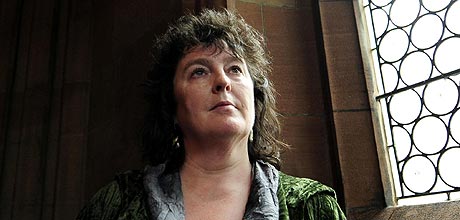|
Selling Manhattan is Carol Ann Duffy's second collection of poetry. It concerns itself with the way that money affects people and cultures. Sound familiar?
Carol Ann Duffy (1955 - --) is a Scottish poet and playwright. She is Professor of Contemporary Poetry at Manchester Metropolitan University, and was appointed Britain's Poet Laureate in May 2009. She is the first woman, the first Scot, and the first openly LGBT person to hold the position. To learn more, read this TIME article |
Approaching Poetry
One starting point for understanding a poem at the simplest level, and for clearing up misunderstanding, is to paraphrase its content or part of its content. To paraphrase a poem means to restate it in different language, so as to make its prose sense as plain as possible. The paraphrase may be longer or shorter than the poem, but it should contain all the ideas in the poem in such a way as to make them clear to a puzzled reader, and to make the central idea, or theme, of the poem more accessible.
|
A Study of Reading Habits
by Philip Larkin (1922-1985) When getting my nose in a book Cured most things short of school, It was worth ruining my eyes To know I could still keep cool, And deal out the old right hook To dirty dogs twice my size. Later, with inch-thick specs, Evil was just my lark: Me and my coat and fangs Had ripping times in the dark. The women I clubbed with sex! I broke them up like meringues. Don't read much now: the dude Who lets the girl down before The hero arrives, the chap Who's yellow and keeps the store Seem far too familiar. Get stewed: Books are a load of crap. |
Larkin’s poem may be paraphrased as follows:
There was a time when reading was one way I could avoid almost all my troubles—except for school. It seemed worth the danger of ruining my eyes to read stories in which I could imagine myself maintaining my poise in the face of threats and having the boxing skills and experience needed to defeat bullies who were twice as big as I. Later, already having to wear thick glasses because my eyesight had become so poor, I found my delight in stories of sex and evil: imaging myself with Dracula cloak and fangs, I relished vicious nocturnal adventures. I fancied myself a criminal who beat and tortured his vulnerable victims, leaving them broken and destroyed! I don’t read much anymore, because now I can identify myself only with the flawed secondary characters, such as the flashy dresser who wins the heroine’s confidence and then betrays her in a moment of crisis before the cowboy hero comes to her rescue, or the cowardly storekeeper who cringes behind the counter at the first sight of danger. Getting drunk is better than reading – books are full of useless lies. |
Who Is the Speaker and What Is the Occasion? To aid us in the understanding of a poem, we may ask ourselves a number of questions about it. Two of the most important are Who is the speaker? and What is the occasion? A cardinal error of some readers is to assume that a speaker who uses the first person pronouns (I, my, mine, me) is always the poet. A less risky course would be to assume that the speaker is someone other than the poet. Poems, like short stories, novels, and plays, belong to the world of fiction, an imaginatively conceived world that at its best is “truer” than the factually “real” world that it reflects. When poets put themselves or their thoughts into a poem, they present a version of themselves; that is, they present a person who in many ways is like themselves but who, consciously or unconsciously, is shaped to fit the needs of the poem. We must be careful, therefore, about identifying anything in a poem with the biography of the poet.
Voice of the Persona:
Voice of the Persona:
- Who is speaking?
- What does the poem reveal about the the persona's character? In some poems the speaker may be nothing more than a voice meditating on a theme, while in others the speaker takes on a specific personality.
- To whom is he or she speaking? Many poems are addressed to no one in particular and therefore to anyone, any reader. Others, while addressed to a specific person, reveal nothing about the person because the focus of the poem is on the speaker's feelings and attitudes.
- What is the speaker's tone? How does the persona feel / what is the persona's attitude?
- Why is he or she speaking?
Place and Perspective
- From what perspective (or point of view) is the speaker describing specific events? Is the speaker recounting events of the past or events that are occurring in the present? If the past events are being recalled, what present meaning do they have for the speaker?
- Does the poem have a setting? Is the poem occasioned by a particular event? The answer to these questions will often be no for lyric poems. It will always be yes if the poem is a dramatic monologue or a poem that tells or implies a story.
What Is the Central Purpose of the Poem? A third important question that we should ask ourselves upon reading any poem is: What is the central purpose of the poem? Our only reliable evidence of the poem’s purpose is the poem itself. The purpose may be to tell a story, to reveal human character, to impart a vivid impression of a scene, to express a mood or emotion, or to convey vividly some idea or attitude. Whatever the purpose is, we must determine it for ourselves and define it mentally as precisely as possible. Only by relating the various details in the poem to the central purpose or theme can we fully understand their function and meaning. Only then can we begin to assess the value of the poem and determine whether it is a good one or a poor one. In “The Man He Killed” the central purpose is quite clear: It is to make us realize more keenly the irrationality of war.
Adapted from Sound and Sense: An Introduction to Poetry by Arp & Perrine
TASK: Read for understanding. Read each poem several times (out loud is best) and fill out the corresponding chart. Your goal is comprehension, not literary feature identification. You must complete this process for all three poems.
- Access the Sound and Sense chart HERE. If you would like an electronic version of the poems, go HERE.
- Choose a poem to start with. Read the poem three times. One time should be out loud or lip reading while someone else reads out loud (one should read a poem as slowly as possible. When you cannot read a poem aloud, lip read it: Form the words with your tongue and mouth even though you do not utter them)
- Paraphrase or summarize each stanza. Define unknown words throughout this process so you can be as specific as possible.
- Identify the speaker/persona - answer the questions listed above
- Identify the perspective of the persona. Refer to the "Place and Perspective" section so you can be more specific.
- Describe the place or setting. Refer to the "Place and Perspective" section so you can be more specific.
- What is the central purpose of the poem?
Analysing Poetry
Task: Choose ONE poem to analyze in detail. Identify literary features and discuss the effect of the features.
In the last 30 minutes of class, you will share your annotations with others in the class.
Word Choice, Word Order, Literary Features
- What type of diction is the poet employing? See the diction section of the lit features guide for 'types'
- How does the poet's word choice affect the meaning of the poem? the tone?
- How does the poet employ figures of speech? (simile, metaphor, personification, hyperbole, symbolism, irony, allusion, alliteration) Refer to this document for literary features.
- Does the word order impact the reading of or the meaning of the poem?
Imagery
- Did you note any descriptive passages? For each image, name the sense that is being appealed to.
- What is the dominant impression being created?
- What is the relationship of the descriptive images to the speaker's state of mind?
- How do images create sense of time of day? season of year? atmosphere? mood?
- Do the images progress? (day to night, hot to cold, soft to loud, color to color, etc)
Structure
How are the stanzas arranged? Is there any significance to the progression of ideas?
How are the lines arranged? Do you notice any examples of caesura, enjambment, or rhyme? Click HERE or HERE for more info



